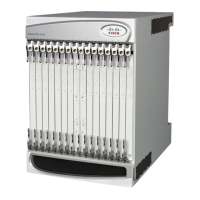Features and Functionality - Base Software ▀
Cisco ASR 5000 Series Product Overview ▄
Support for Multiple Detail Record Types
Diameter Credit Control Application
Accept TCP Connections from DCCA Server
Gy Interface Support
The Enhanced Charging Service (ECS) is an in-line service feature that is integrated within the system. ECS enhances
the mobile carrier's ability to provide flexible, differentiated, and detailed billing to subscribers by using Layer 3
through Layer 7 deep packet inspection with the ability to integrate with back-end billing mediation systems.
ECS interacts with active mediation systems to provide full real-time prepaid and active charging capabilities. Here the
active mediation system provides the rating and charging function for different applications.
In addition, ECS also includes extensive record generation capabilities for post-paid charging with in-depth
understanding of the user session. Refer to the Support for Multiple Detail Record Types section for more information.
The major components include:
Service Steering: Directs subscriber traffic into the ECS subsystem. Service Steering is used to direct selective
subscriber traffic flows via an Access Control List (ACL). It is used for other redirection applications as well
for both internal and external services and servers.
Protocol Analyzer: The software stack responsible for analyzing the individual protocol fields and states during
packet inspection. It performs two types of packet inspection:
Shallow Packet Inspection: inspection of the layer 3 (IP header) and layer 4 (e.g. UDP or TCP header)
information.
Deep Packet Inspection: inspection of layer 7 and 7+ information. Deep packet inspection
functionality includes:
Detection of URI (Uniform Resource Identifier) information at level 7 (e.g., HTTP, WTP,
RTSP Uniform Resource Locators (URLs)).
Identification of true destination in the case of terminating proxies, where shallow packet
inspection would only reveal the destination IP address / port number of a terminating proxy.
De-encapsulation of upper layer protocol headers, such as MMS-over-WTP, WSP-over-UDP,
and IP-over GPRS.
Verification that traffic actually conforms to the protocol the layer 4 port number suggests.
Rule Definitions: User-defined expressions, based on protocol fields and/or protocol-states, which define what
actions to take when specific field values are true. Expressions may contain a number of operator types (string,
=, >, etc.) based on the data type of the operand. Each Ruledef configuration is consisting of multiple
expressions applicable to any of the fields or states supported by the respective analyzers.
Rule Bases: a collection of rule definitions and their associated billing policy. The rule base determines the
action to be taken when a rule is matched. It is possible to define a rule definition with different actions.
Mediation and Charging Methods
To provide maximum flexibility when integrating with billing mediation systems, ECS supports a full range of charging
and authorization interfaces.
Pre-paid: In a pre-paid environment, the subscribers pay for service prior to use. While the subscriber is using
the service, credit is deducted from subscriber's account until it is exhausted or call ends. The pre-paid

